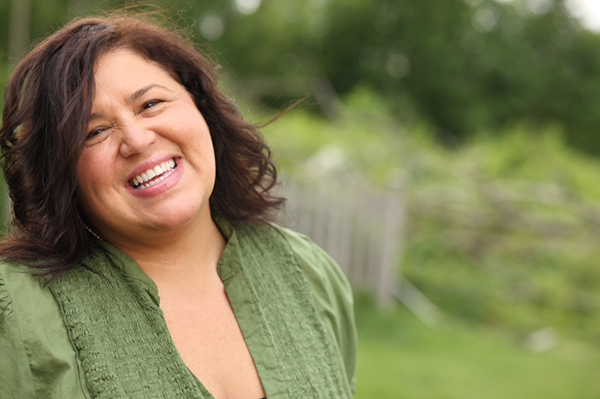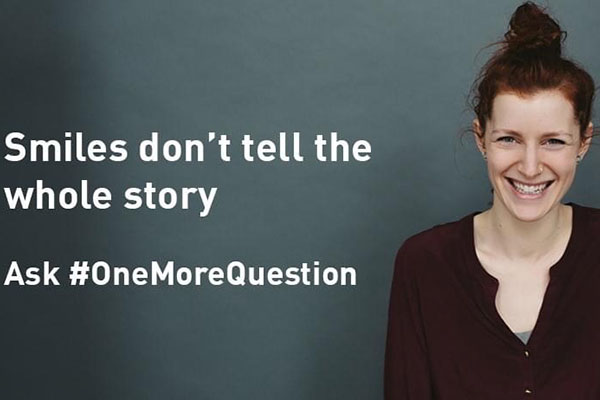Travel During Spring Break
Dr. Gilmore was interviewed on Q13 about traveling during spring break.
Dr. Gilmore on World No Tobacco Day
Dr. Ari Gilmore visited Q13 News to discuss World No Tobacco Day and the positive impacts that raising the legal age to buy tobacco in the state may have.
Pacific Medical Centers Launch an Important Mental Health Awareness Campaign
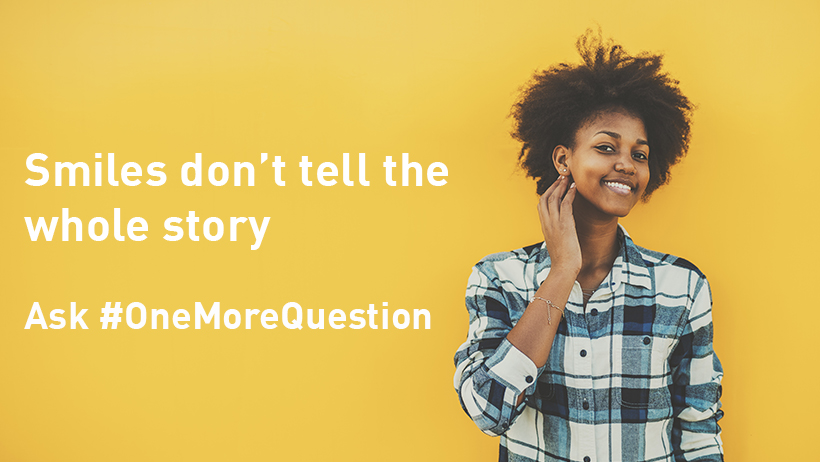
According to The Washington Nurses Association, about 45 million people in this country (4.2 percent of the U.S. population) suffer from mental illness and at least 10 million of these people suffer from serious mental illness. With those stats in mind, PacMed has launched a campaign that highlights awareness, de-stigmatization, screening for depression and the role of primary care relationships as a first step in identifying potential concerns—OneMoreQuestion.
Q: What is the motivation behind starting this campaign, and why is it so important?
A: The One More Question concept stemmed from an impactful story of a Pacific Medical Centers (PacMed) primary care provider after a family came in for a visit. The provider noticed something about one of the children and decided to continue with a depression screening, and the questions she asked revealed that this child had plans to end his life. Through the screening and recognition of this, they were able to receive resources and support. PacMed’s One More Question campaign encourages us to become present when asking one more question in our own lives; when checking in with a friend, patient, coworker or family member. Remember, we can all make a difference in someone’s outcome.
Life always seems to have its ups and downs, and those chaotic moments can come in waves. Maintaining our connections to one another helps to navigate the waters when our lives can mimic rough seas. Connections and their potential to influence our lives are why One More Question is an important conversation for all of us to be having.
May is also Mental Health Awareness month, a time for us to elevate the topic of mental health in our communities and to encourage others to join us in this work. We want to empower patients and our communities to take an active role in caring for themselves and their networks. As an organization, PacMed wants to connect with people before a crisis occurs. We want to open up the conversation about mental health, to de-stigmatize the topic of mental health and depression, and to remember depression does not look the same for everyone. We know that mental health issues will affect one in five Americans, so chances are there is someone you know who is affected.
Q: How (and where) can readers access #OneMoreQuestion themselves, and/or how can Seattleites take advantage of local resources?
A: As humans, we all want to and need to be seen and heard in an honest way. We may not have all of the answers or be able to solve someone else’s problems, but we can listen. The simple act of listening can drastically change someone’s outcome or perspective during a hard time in their life.
Big or small, these acts can bring a sense of caring into someone’s darkest times. One more question can have a profound positive effect on which path someone takes when struggling. Even those who seem the strongest need to know that others are there to support them. As a primary care doctor, I would encourage everyone to talk with their doctor. Your doctor can help identify resources, support or refer you to a licensed mental health provider.
If you are in crisis, please consider utilizing your local or national resources, which could include King County 24-hours Crisis Line at 1-866-4-CRISIS, National Suicide Prevention Lifeline at 1-800-273-TALK(8255) or the Crisis Text Line by texting TALK to 741741. It is important to remember you are not alone, in urgent cases, please call your health care provider and tell them it’s urgent, call 9-1-1, or go to your nearest emergency room at your local hospital. If you would like to learn more about the One More Question campaign, visit our news story PacMed encourages #OneMoreQuestion for depression.
LWA Spotlight: On-Site Yoga!
 On-Site Yoga—Coming This June!
On-Site Yoga—Coming This June!
Living Well Alliance is excited to announce that Christy Goff, the registered dietitian who leads Living Well Alliance, will soon be able to offer on-site yoga at your company! Christy finished her 200-hour yoga teacher training program in February and is excited to share her theme-based classes with all ages and abilities. Her philosophy is to provide yoga for all levels and abilities, making students feel comfortable and empowered. Help your employees increase mindfulness, think outside the box and improve posture and flexibility. For more information, email LivingWellAlliance@pacmed.org.
The Living Well Alliance is run by Pacific Medical Centers. Call us today at 206.621.4419 for more information or email LivingWellAlliance@pacmed.org.
Recipe: Strawberry goat cheese bruschetta
 Late May and June are the true season of strawberries in the Pacific Northwest! Enjoy them at their sweetest and cheapest—and paired with savory and creamy goat cheese on toast. Feeling adventurous? Find a local farm where you can pick your own at www.pickyourown.org.
Late May and June are the true season of strawberries in the Pacific Northwest! Enjoy them at their sweetest and cheapest—and paired with savory and creamy goat cheese on toast. Feeling adventurous? Find a local farm where you can pick your own at www.pickyourown.org.
Meal plans for bone and eye health
 NUTRITION CORNER: Planning Meals for Strong Bones and Good Vision
NUTRITION CORNER: Planning Meals for Strong Bones and Good Vision
May is Osteoporosis Month and June is Cataract Awareness Month. So in this edition, we are sharing nutrition information tied to bone and vision health. Then, to help you take action, we have included some powerful tips on meal planning. As always, work closely with your medical provider to create a care plan that’s right for you.
Nutrition for Healthy Bones and Eyes
Calcium, vitamin D and magnesium all help to maintain strong, resilient bones. fortified juices, canned salmon and tofu. Other excellent sources are figs, cooked bok choy, sardines, almonds, sesame seeds and cooked white beans. Dietary sources of vitamin D include milk, some yogurt, eggs, mushroom and some fortified foods. You can get magnesium from leafy green vegetables, whole grains, beans and nuts.
When it comes to vision, studies have shown that some nutrients may help prevent age-related macular degeneration, a common eye condition and the leading cause of vision loss in people over 50. Supplements are one approach, but experts agree that the best method is to consume a varied diet that’s rich in antioxidants, lutein and zeaxanthin . Recommended sources are egg yolks, dark green vegetables and some yellow-orange fruits and vegetables such as corn, nectarines, oranges, papaya, squash and sweet potatoes.
Meal Planning 101
A weekly menu is the most important step to consistently eating healthy meals! Try these tips to make your meal planning a success for strong bones, good vision and overall health.
- Make a weekly menu in advance. Your menu doesn’t need to be fancy. Just aim for a basic framework of meals. Choose a regular time each week to make your plan. Overwhelmed? Start with planning one or two meals in advance.
- Choose meals that have leftovers. Leftovers are perfectly legitimate for another day’s lunch or dinner! For example, baked salmon on Monday can top a salad or go in a tortilla wrap on Tuesday.
- Use ingredients that are versatile. Select a few ingredients that work across various dishes. Sautéed kale can be eaten with olive oil and seasoning at dinnertime, or added to scrambled eggs. Hardboiled eggs are an easy breakfast item or can be part of a Cobb salad for dinner.
- Keep it simple. You don’t need exotic or elaborate dishes each night. Instead, imagine a plate that is half vegetables/fruits, one-quarter grains and one-quarter protein. Example: Swiss chard, sweet potatoes, brown rice and chicken.
- Cook in bulk. Put that freezer to work! When buying and cooking, double the recipe and then put half in the freezer for when life gets busy. Try making two quiches and freeze one. You can also freeze cooked grains and marinated meats.
- Keep your plan visible. Whether on the counter or hanging on the fridge, having your plan accessible will keep you focused on upcoming meals.
- Chop and cut once. Cleaning and prepping ingredients can take up precious time. Consider chopping all your veggie and meats at the start of the week. Store each recipe’s portions in separate containers in the fridge, ready to go.
- Keep a list of successes. Was one meal easy to prepare and enjoyed by your family? Maybe it worked well for leftovers? Keep a list of those meals for easy repeats!
PacMed has dietitians who can help you meet your nutritional needs. Learn about the dietitian services at PacMed. Or call to make an appointment: 206.505.1300.
Finding peace with the sun
 When his new barber got too popular, Seattle patient Russ tried trimming his own hair back at home. That’s when he noticed a new spot on the back of his neck.
When his new barber got too popular, Seattle patient Russ tried trimming his own hair back at home. That’s when he noticed a new spot on the back of his neck.
“My first thought was to shrug it off,” says Russ. “But after thinking it over, I took out my cellphone and snapped a photo to send to the doctor.”
It’s a good thing he did. Soon after delivering the photo, he was asked to come in for a series of appointments, which led to a diagnosis: melanoma.
“I went through some initial scary moments when I saw the report, but the doctor was able to explain it was just stage zero,” says Russ. Having caught the skin cancer early, treatment was simple and complete within weeks, and now he wears sunscreen daily.
Many Northwest residents flock outside in April to soak in the vitamin D as soon as the sun appears. Our many cloudy days can make the sun feel like an old forgotten friend, bringing mixed feelings when it reappears. It can help us feel better—and take better care of ourselves—to remember the sun shines through all the time, even when we don’t see it.
“It’s obvious you need to wear sunglasses when the sun is intense,” says Tony Huynh, MD, an ophthalmologist at PacMed’s Canyon Park and First Hill clinics. “But it’s important to protect your eyes year-round, even when it’s cloudy. Those damaging rays can still get through the clouds.”
One sign of the Seattle area’s mixed relationship with the sun is our high rate of sunglasses purchases—50% higher per capita than the national average by one measure, possibly because we forget where our shades are stored over long cloudy periods.
If you forgot where your last pair of sunglasses was stored, it’s good to pick up a new pair, according to Dr. Huynh: “Your eyes can get sunburned, just like the rest of your skin, which can be painful. But without protecting your eyes, the damage can be much worse, ranging from abnormal growths to cataracts to macular degeneration.”
Dr. Huynh emphasizes the importance of choosing wraparound sunglasses with 100% UV protection. He also recommends brown and orange-amber tints, which are better than gray or blue tints at blocking the low-wavelength light that can cause serious damage over time.
While Russ had a close call with melanoma, the wake-up call helped him improve his relationship with the sun. “I’m a rower, and a lot of times I’d get on the water and realize I forgot the sunscreen. Now I know which sunscreen is best, and stocked up on the zinc oxide and a few hats. I definitely feel more empowered now going out in the sun.”
Tony Huynh, MD, practices ophthalmology at our Canyon Park (Bothell) and First Hill clinics. Learn more about him at our website, or call 206.329.3937 to schedule an appointment.
Concerns about bone density? We can help
 Bone Up on Bone Health
Bone Up on Bone Health
Sitting around—which many of us do too much of during the cold months—is a major risk factor of osteoporosis and low bone mass. The aging process also affects bone density, and women are far more prone to osteoporosis than men (an estimated 80% versus 20%). The good news is that stress on bones—such as walking or weightlifting—stimulates bone growth.
As you ease into physical activity again or have any concerns about bone density, we can help! The best way to detect osteoporosis accurately is a low-radiation form of X-ray technology called dual-energy X-ray absorptiometry or DXA (pronounced “dexa”). DXA is a quick, painless procedure for measuring bone loss. The DXA test can also assess your risk for developing fractures. If your bone density is found to be low, you and your physician can work together on a treatment plan to help prevent fractures before they occur.
As you get moving again, ease back into weight-bearing activities, ask your PacMed doctor about DXA if you have bone concerns—and if you drink milk, save up your cartons for a team or your own boat at July’s Milk Carton Derby at Green Lake!
The best place to start your journey to improved bones is with your primary care doctor. If you are looking for a new doctor, explore the PacMed clinics and our primary care services. We also offer DXA scans and nutrition counseling with our registered dietitians .
Heart advice helps women stay “on top”
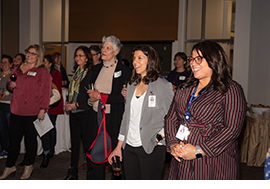 BEACON HILL—At last quarter’s Women on Top networking happy hour, held in PacMed’s beautiful panoramic room overlooking the city, our Cardiologist Dr. Pathmaja (Bobbie) Paramsothy shared how women can take precautions against their risk of death from heart disease and stroke.
BEACON HILL—At last quarter’s Women on Top networking happy hour, held in PacMed’s beautiful panoramic room overlooking the city, our Cardiologist Dr. Pathmaja (Bobbie) Paramsothy shared how women can take precautions against their risk of death from heart disease and stroke.
The resonant message was warmly received by the audience, so we thought we’d share the scoop here through an exclusive Q&A session!
Are women more likely to have heart disease in their lifetime than men?
Women, now, have a higher prevalence of strokes than men. Men still have a higher prevalence of heart disease, but heart disease is the number one killer of both men and women in the United States.
We’ve heard women can have different symptoms then men—what should we look for? (Listen up, ladies!)
Any discomfort in the chest/neck/jaw/left arm that occurs with exertion especially could be a sign of heart disease. Feeling your heart beat irregularly or fast, feeling lightheaded at random times or when exercising, unusual shortness of breath could all be symptoms.
If you are unable to walk up a flight of stairs without significant shortness of breath, this could be a sign of heart disease or lung disease. New and significant fatigue could also be a sign of heart disease. These are not the only symptoms but these symptoms should prompt medical attention.
Women may have more atypical symptoms but overall men and women both can have “classic” symptoms or atypical symptoms. Women’s symptoms may not be recognized as quickly.
What can women proactively do for better heart health?
Eating a healthy diet, such as the “Mediterranean Diet” and specifically avoiding simple carbohydrates, sugar, saturated and trans fats and excess sodium are important.
Exercising regularly is also very important, but if you have unusual symptoms exercising, see your doctor first to make sure it is safe to exercise. It’s also good to check that you do not need testing prior to engaging in an exercise program.
Know your numbers: Get your blood pressure, blood sugar and cholesterol checked and treated.
Learn your family history, decrease unwanted stress, and get good sleep.
How important are lifestyle choices towards better heart health?
Lifestyle choices are extremely important to good health. Prevention is the first step and eating a healthy diet, getting regular exercise, good sleep, maintaining a healthy weight, and good social support all promote good health.
When should I see a cardiologist? How do I find the right one?
Your primary care physician is the best resource to determine if you need a cardiologist. They will know who they trust and like to refer their patients. You want your cardiologist to be board certified and up to date on medical credentialing.
Dr. Paramsothy, also known as Dr. Bobbie, has been practicing for 13.5 years and received her training at the University of Washington (Go Huskies)! Dr. Paramsothy has limited clinic availability, but someone from the PacMed Cardiology Team will be happy help if you have further questions or concerns.
Women on Top is a quarterly social gathering for professional female and gender-diverse people at spectacular venues high above the Seattle skyline, organized by the Greater Seattle Business Association (GSBA). PacMed is a longtime Gold Sponsor of the GSBA, and sponsor of the Women on Top series.
The next Women on Top event will take place Thursday, May 9, from 6-8 pm at Fran’s Chocolates in Georgetown, and will feature a nonprofit spotlight on the Urban League. Tickets sell out fast—visit thegsba.org/events to register.
PacMed encourages #OneMoreQuestion for depression
PacMed encourages #OneMoreQuestion for depression
Deeper conversation can encourage those facing mental health challenges to find help.
The following campaign appeared on PacMed sites and social media from May-June 2019:
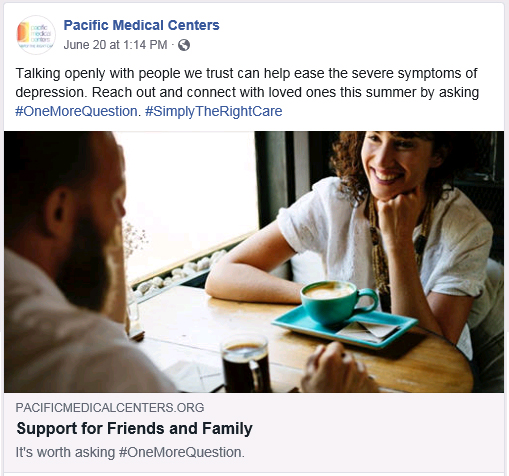 |
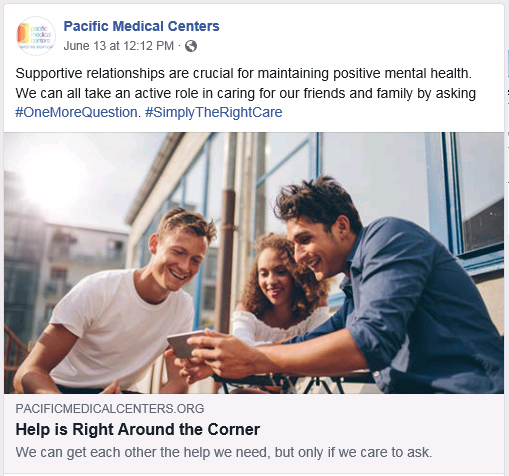 |
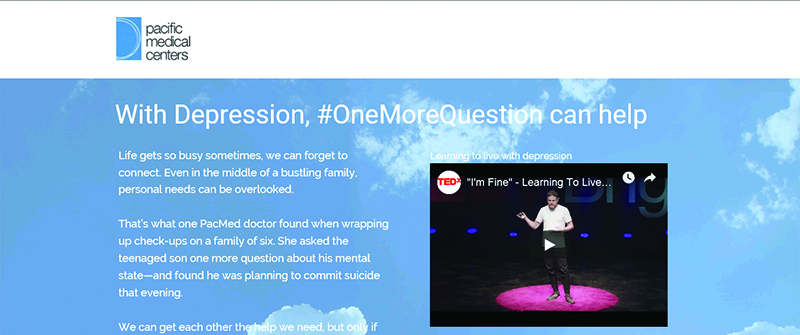 |
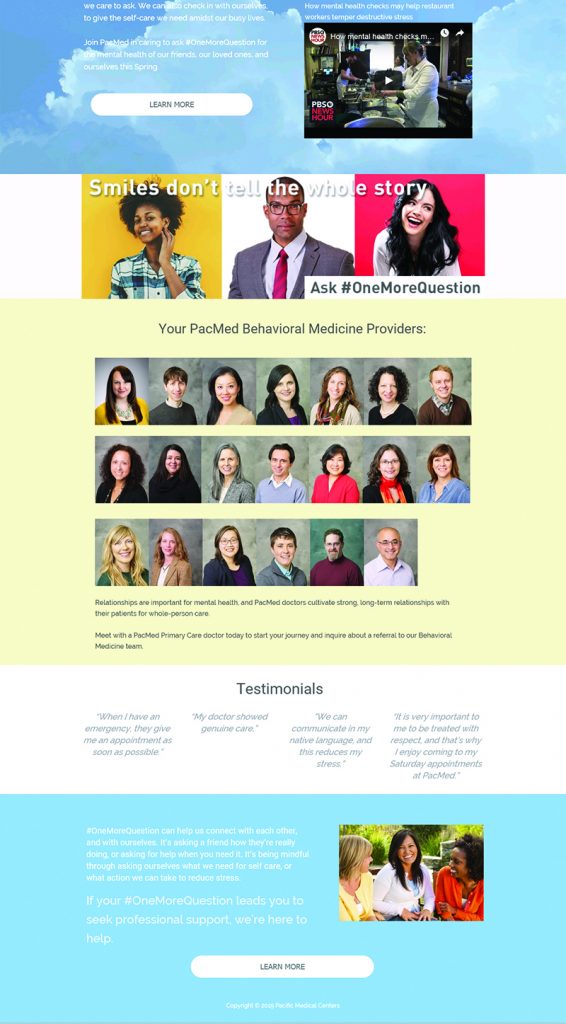 |
#OneMoreQuestion can help us connect with each other, and with ourselves. It’s asking a friend how they’re really doing, or asking for help when you need it. It’s being mindful through asking ourselves what we need for self care, or what action we can take to reduce stress.
If your #OneMoreQuestion leads you to seek professional support, we’re here to help.








